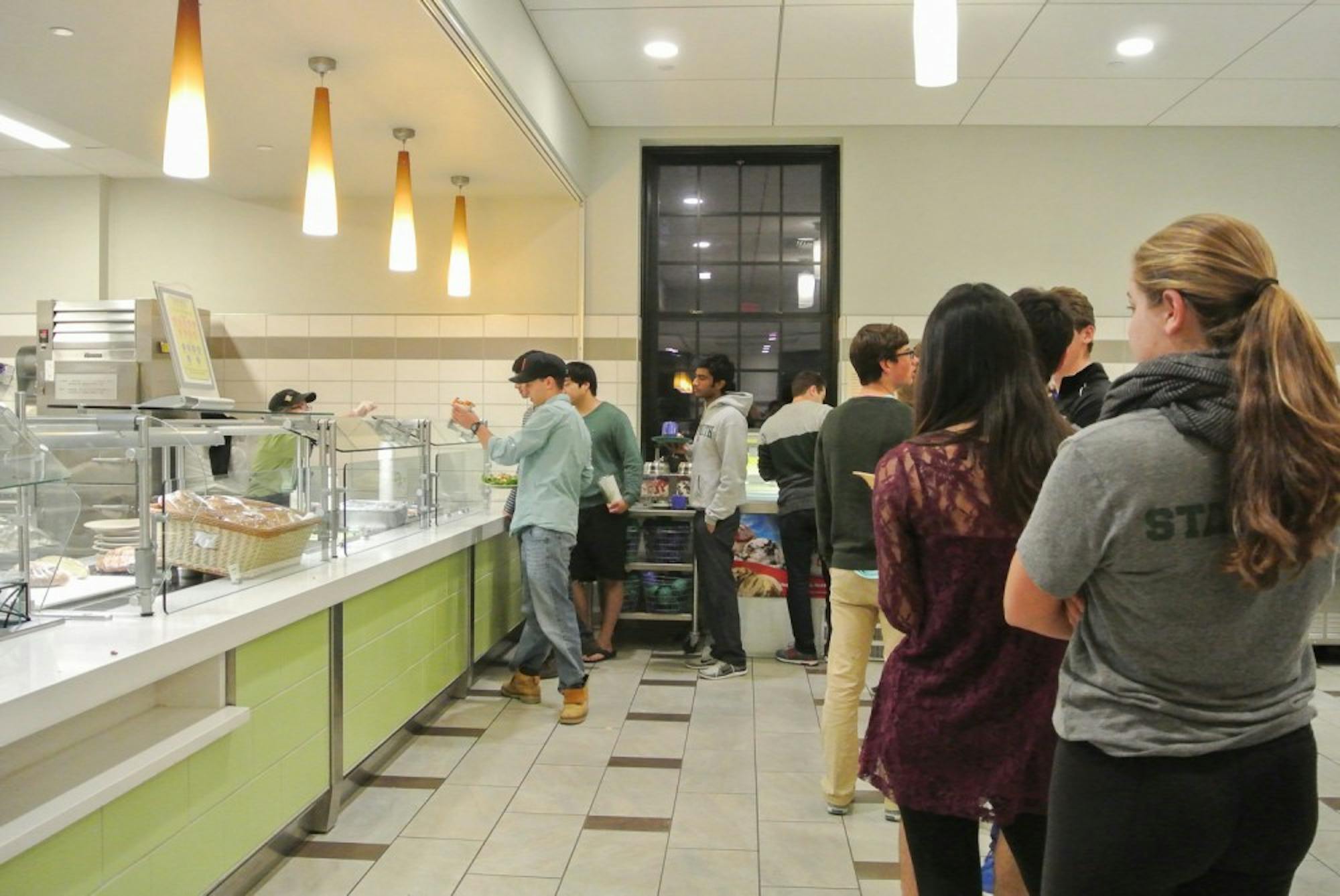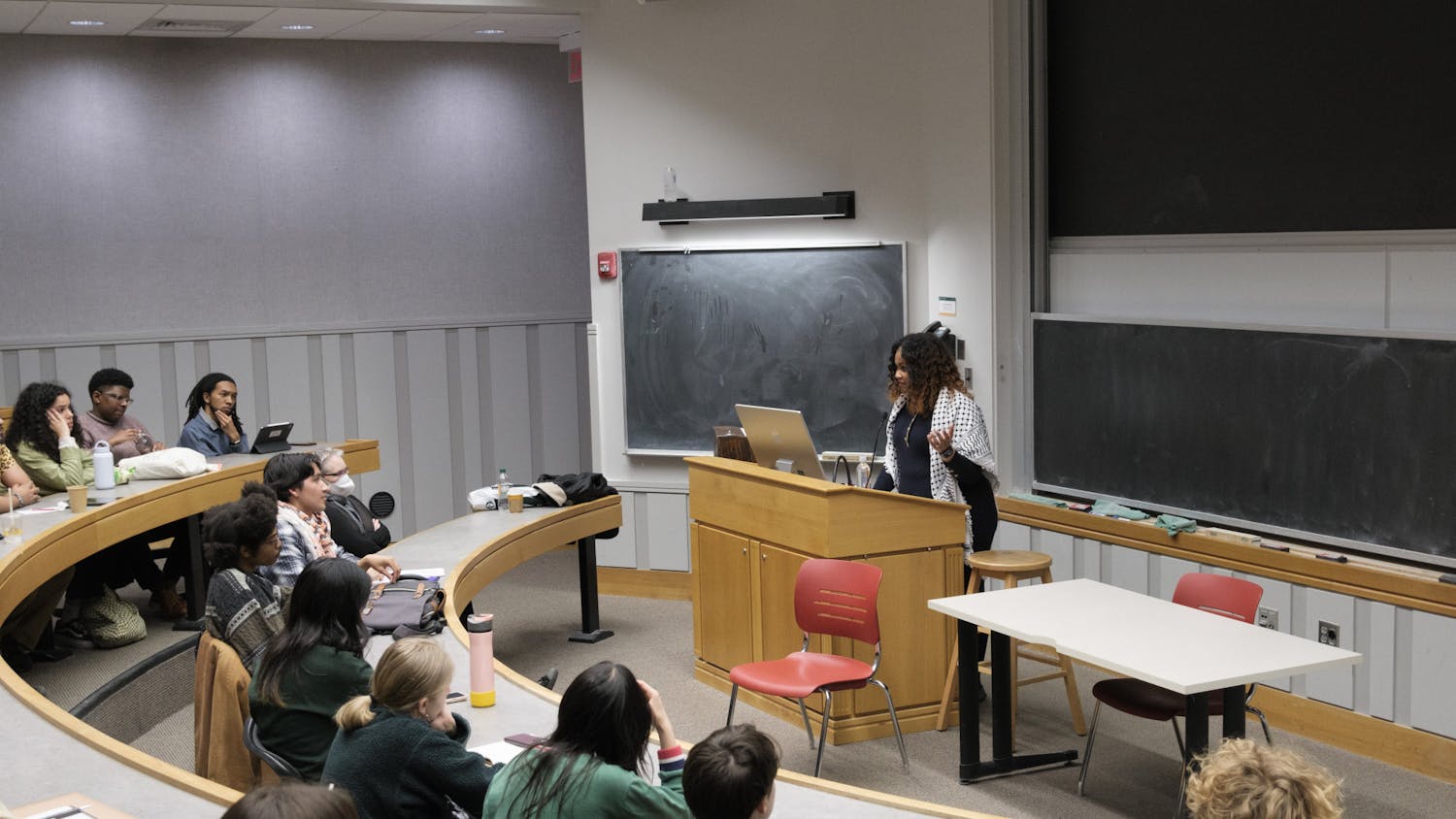The student campaign to push the College to provide better kosher dining options has been making slow progress in recent weeks, as the working group set up to discuss the issue has yet to meet.
What the College has been advertising as kosher food at the Class of 1953 Commons is not actually proper kosher according to the strict demands of Orthodox and Conservative Judaism, Orthodox Jewish student leaders of the campaign said. The preparation of kosher food is required to be supervised by a Jew who keeps the Sabbath. The current supervisor, or Mashgiach, at Dartmouth is from Tablet-K, which is not a certified kosher organization.
The Dartmouth Dining Services website states that the Pavilion, located in ’53 Commons, is a dairy-free kosher kitchen providing meat and pareve meals.
DDS director David Newlove, DDS associate director Don Reed and Dartmouth Hillel executive director Rabbi Edward Boraz declined to comment for the article.
Mayer Schein ’16, an Orthodox Jewish student and one of the leaders of the campaign pushing for improved kosher options on campus, said he has been fighting to have his concerns addressed since he first arrived on campus in his freshman year. Back then, he said he was the only one in his class directly affected, and even after he approached a campus Rabbi to explain the situation, not much was done. Now, Schein has been joined by several other Jewish students who are eager to petition for proper kosher food on campus.
The campaign started near the end of last fall term.
“We’re still largely in the same place,” Matthew Goldstein ’18, who is also an Orthodox Jewish student and who comes from a strong kosher background, said. Goldstein said he came to Dartmouth with the expectation that there was going to be kosher food.
Cameron Isen ’18, also an Orthodox Jewish student, said that he, along with the other Orthodox students, finds it impossible to eat on campus.
“We just think it’s wrong on so many levels,” Isen said. “We’re just trying to push the school to get better in a lot of respects, and recognize that this is more of an issue of fairness than anything else.”
Schein, Goldstein, Isen and Eliza Ezrapour ’18, also an Orthodox Jew, got together because they realized that there were many pieces of the Jewish law of kashrut that the College was not following. They were also already familiar with one another.
“There’s very few Orthodox Jewish students here, and we all know each other,” Isen said.
Schein, Goldstein and Isen have been obligated to find other means of eating every term. Goldstein mainly eats the food he brings from home or that he buys from the Co-op Food store. Schein often goes to a rabbi’s house for dinner, or he eats the food sent to him by his parents. Isen also makes all his meals in his dorm room, adding that the lack of kosher options on campus has become a health issue for him.
“Now it’s just really a matter of great frustration for a lot of the people involved,” Goldstein said, explaining that the College has been dragging its feet in addressing the matter for the past eight months.
The students involved have given the College a list of qualified kosher organizations in the region, as well as a full report on why the situation is not up to standards and what would need to be done to improve it. The group also circulated a petition online, asking the College to provide the kosher kitchen with an Orthodox certification. As of press time, 715 people have signed the petition. There are around 400 Jewish students on campus. Isen said the College did not respond to their concerns until the petition came out.
“The petition represents the fact that there are other students at Dartmouth and people in the world...who really care about this issue,” Isen said. “It could be because they want to eat kosher food, but what I really think it’s about is the idea of fairness and equality.”
Schein said from their actions so far, administrators seem more concerned with “saving face” than actually serving proper kosher food that Jewish students can eat.
“[The College] is very much aware that this isn’t kosher food, and they’re still refusing to serve kosher food,” Schein said. “It’s no longer ‘Dartmouth students petition for better kosher options.’ Now it’s ‘We petitioned, and the College acknowledged the petition, and still refuses to serve kosher food.’”
In the past month, the College has established a working group, headed by director of the Dickey Center for International Understanding Daniel Benjamin, to address the issue. The group has not met yet but plans to hold its first meeting on Monday.
“The concept behind [the working group] is to examine issues that several students have raised regarding the provision of kosher food at Dartmouth,” Benjamin said.
Benjamin said the group will try to come up with some “thoughtful and reasonable potential solutions” to solve the issue. He said he hopes the working group will be able to wrap up the issue by the end of this term. Since the group has not met yet, Benjamin was unable to comment further on specific goals and plans.
Some of the Orthodox students involved met with College administrators on Sept. 21, but did not hear back about the formation of the working group until two weeks later.
“This whole process has been incredibly bureaucratic and incredibly slow,” Goldstein said.
Dartmouth is the only Ivy League school that does not provide properly certified kosher dining options. At Cornell University, the main kosher dining hall, 104West!, is open for lunch and dinner every day of the week. The staff there also prepare grab-and-go options such as wraps, salads and sandwiches.
At Cornell, about 60 students eat kosher food regularly, but during Shabbat dinners on Friday, 150 students can be expected to show up to the kosher dining hall, Paul Muscente, associate director of west campus Cornell dining and overseer of the Orthodox Union kosher program, said.
“We have a Mashgiach right on site who provides the supervision,” Muscente said. “I think the students are happy with the program we have.”
At Harvard University, in each of the 13 undergraduate dining halls there is a kosher corner, which includes a refrigerator and a freezer with pre-made options that students can heat up. Crista Martin, Harvard’s director of strategic initiatives and communications, says there are breads, meats and re-heatable meal options. She added that there are even toasters and microwave ovens especially designated for the kosher corners.
In addition, Harvard Hillel has a kosher dining hall that is open for dinners and for holiday meals.
“It has a fuller variety and is more like a typical dining hall,” Martin said. “We’re all working exceedingly hard to meet folks’ needs at the highest level possible.”
Goldstein, Schein and Isen all said the ultimate goal of their campaign is for Dartmouth to get on board with its peer institutions and start offering acceptable kosher food as soon as possible.
“It’s less about the students and more about the College’s failure to uphold the values that they claim to have,” Schein said.
Goldstein is a member of The Dartmouth opinion staff.
Sonia is a junior from Ottawa, Canada. (That is the mysterious Canadian capital that no one seems to ever have heard of.) She is a double major in Economics and Government, with a minor in French. She decided to join The D’s news team in her freshman fall because of her love of writing, talking to people, getting the most up-to-date news on campus, and having a large community of fellow students to share these interests with.




